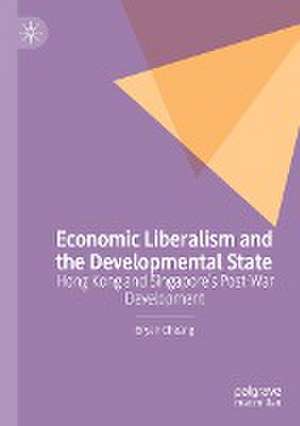Economic Liberalism and the Developmental State: Hong Kong and Singapore’s Post-war Development
Autor Bryan Cheangen Limba Engleză Paperback – 12 noi 2023
The book highlights the complex ways in which states penetrate markets, which are often neglected in liberal accounts of Hong Kong and Singapore as ‘free-market success stories’. At the same time, it also stands as a cautionary tale on the use of non-comprehensive development planning in the twenty-first century, where an unprecedented degree of complexity complicates economic policy and industrial upgrading. The book renews the case for economic liberalism in development policy through a unique Asian cultural lens.
| Toate formatele și edițiile | Preț | Express |
|---|---|---|
| Paperback (1) | 782.24 lei 6-8 săpt. | |
| Springer International Publishing – 12 noi 2023 | 782.24 lei 6-8 săpt. | |
| Hardback (1) | 787.47 lei 6-8 săpt. | |
| Springer International Publishing – 11 noi 2022 | 787.47 lei 6-8 săpt. |
Preț: 782.24 lei
Preț vechi: 953.96 lei
-18% Nou
Puncte Express: 1173
Preț estimativ în valută:
149.73€ • 162.69$ • 125.85£
149.73€ • 162.69$ • 125.85£
Carte tipărită la comandă
Livrare economică 21 aprilie-05 mai
Preluare comenzi: 021 569.72.76
Specificații
ISBN-13: 9783031081026
ISBN-10: 3031081021
Ilustrații: XXIII, 352 p. 70 illus.
Dimensiuni: 148 x 210 mm
Greutate: 0.45 kg
Ediția:1st ed. 2023
Editura: Springer International Publishing
Colecția Palgrave Macmillan
Locul publicării:Cham, Switzerland
ISBN-10: 3031081021
Ilustrații: XXIII, 352 p. 70 illus.
Dimensiuni: 148 x 210 mm
Greutate: 0.45 kg
Ediția:1st ed. 2023
Editura: Springer International Publishing
Colecția Palgrave Macmillan
Locul publicării:Cham, Switzerland
Cuprins
1. Developmental State and Economic Liberalism.- 2. Economic Freedom, Institutional Arrangements, and Local Context.- 3. State Capitalism vs. Entrepreneurial Capitalism.- 4. Development Requires Freedom.- 5. Hong Kong and Singapore as an Anglo-Chinese Success Story.- 6. Reassessing Relative Economic Performance.- 7. State and the Creative Class.- 8. Conclusion: Reconsidering Developmental State Exceptionalism.
Notă biografică
Bryan Cheang is Assistant Director of the Center for the Study of Governance and Society, King’s College London, UK. His research interests are in the political economy of development and applied economic policy, with a specific focus on the institutional arrangements of the entrepreneurial state and the efficacy of industrial policy interventions.
Textul de pe ultima copertă
“Singapore and Hong Kong are often used as examples of successful government economic development policies. Bryan Cheang offers a comparative analysis of both countries to show that the case for a state-led development model has been overstated. Creative and entrepreneurial activities generate long-term economic development, and Cheang shows how government policies have often stood in the way of economic development. This book is highly recommended for those interested in Singapore & Hong Kong, as well as implications on East Asia and the role of the state in development”.
- Randall Holcombe, DeVoe Moore Professor of Economics, Florida State University, USA.
- Randall Holcombe, DeVoe Moore Professor of Economics, Florida State University, USA.
This book provides a fresh perspective on the debate over the role of the state in East Asia’s development history. Comparing the post-war development policies of Singapore and Hong Kong, it argues that their strong economic performances preceded and persisteddespite, not because of, developmental state policies. While both nations are not pure free markets, the Hong Kong economy comes closer to that ideal and exhibited clear advantages over state-driven Singapore, in terms of greater levels of indigenous entrepreneurship, productivity and innovation.
The book highlights the complex ways in which states penetrate markets, which are often neglected in liberal accounts of Hong Kong and Singapore as ‘free-market success stories’. At the same time, it also stands as a cautionary tale on the use of non-comprehensive development planning in the twenty-first century, where an unprecedented degree of complexity complicates economic policy and industrial upgrading. The book renews the case for economic liberalism in development policy through a unique Asian cultural lens.
The book highlights the complex ways in which states penetrate markets, which are often neglected in liberal accounts of Hong Kong and Singapore as ‘free-market success stories’. At the same time, it also stands as a cautionary tale on the use of non-comprehensive development planning in the twenty-first century, where an unprecedented degree of complexity complicates economic policy and industrial upgrading. The book renews the case for economic liberalism in development policy through a unique Asian cultural lens.
Bryan Cheang is Assistant Director of the Center for the Study of Governance and Society, King’s College London, UK. His research interestsare in the political economy of development and applied economic policy, with a specific focus on the institutional arrangements of the entrepreneurial state and the efficacy of industrial policy interventions.
Caracteristici
Provides a fresh perspective on the debate over the role of the state in development policy Compares the post-war development policies of Singapore and Hong Kong Offers a cautionary tale on the use of non-comprehensive development planning
